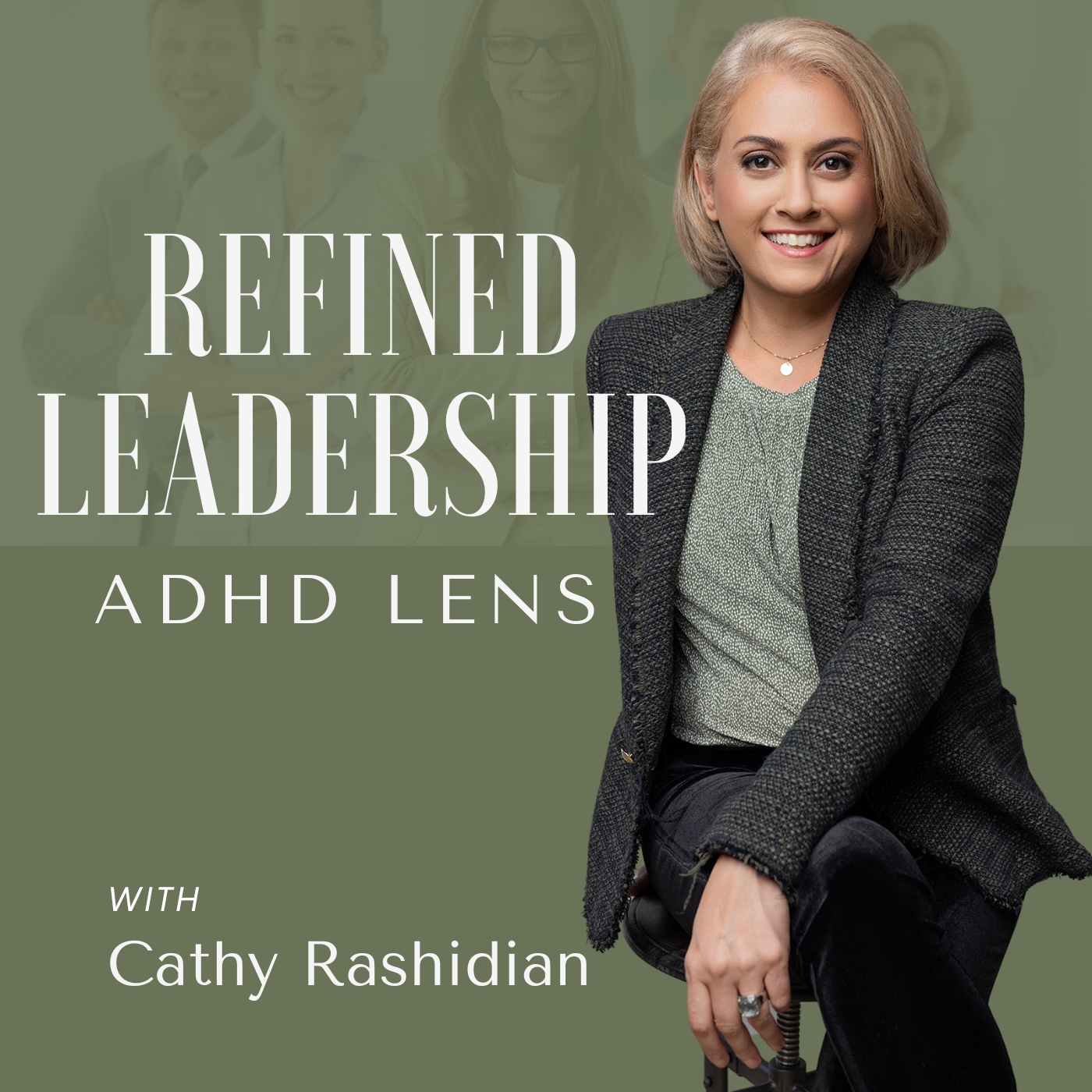
Hypercast: An ADHD Podcast
Hypercast is your companion through the world of ADHD, offering an authentic and engaging look at life with ADHD. Join ADHD coaches Melissa and Brianna as they navigate the complexities of ADHD with heart, humor, and expert insights. From discussions on the latest research to personal stories of triumphs and struggles, Hypercast delves deep into every facet of ADHD.
Whether you're newly diagnosed, a long-time ADHDer, or someone who loves and supports an ADHDer, this podcast is for you. We explore a variety of topics, from ADHD relationships, late diagnosis, and co-occurring conditions to practical advice on everyday challenges.
Hypercast provides a supportive space for open, honest, and well-informed conversations about ADHD, including the cultural misconceptions and stigmas surrounding it. Melissa and Brianna share strategies, tools, and encouragement to help listeners thrive and navigate a world not built for their neurodivergent minds.
Tune in for insightful discussions, real-life experiences, and resources to help you along the ADHD journey, and know you're not alone. Hypercast is your auditory haven, bringing community and understanding to every episode.
Hypercast: An ADHD Podcast
Side Quests: ADHD & Authenticity in Everyday Moments
What if obligatory social norms like sending thank you cards and following strict gift-giving rules could be swapped for genuine, heartfelt gestures? On today’s Hypercast SideQuests, ADHD coaches Melissa and Brianna share their light-hearted, yet deeply meaningful, experiences navigating neurodivergent and neurotypical relationships. From the joy of receiving spontaneous, thoughtful gifts to the balancing act of managing dinner plans and taxes, we reveal the beauty of complementary partnerships and question the necessity of certain societal expectations.
Join us as we recount amusing tales of forgotten anniversaries and unexpected surprises, highlighting how neurodivergent individuals often bring unparalleled creativity and joy to their relationships. If you’ve ever felt overwhelmed by traditional social customs or wondered why certain norms exist, this episode offers a refreshing perspective. Embrace the idea that a simple text or a random surprise can be far more impactful than any obligatory birthday gift. Tune in for a candid, entertaining discussion that celebrates the richness of authentic human connections.
Melissa's Contact:
Email: melissa@likemindcoaching.com
www.likemindcoaching.com
Brianna's Contact:
Email: info@understandingadhd.ca
www.understandingADHD.ca
Follow Us On Instagram
Hey everyone, welcome to Hypercast SideQuests. I'm Melissa, an ADHD coach and advocate.
Brianna:Hi, I'm Brianna, an ADHD coach and soon-to-be therapist. These bonus episodes are all about the random fun tangents that we go on.
Melissa:Yep, we're sharing the quirky, interesting and sometimes hilarious sidetracks that didn't make it into the main episodes. Ready for some fun.
Brianna:Let's jump into today's side quest. Hopefully, the world is going in a direction where there is more understanding, there is more empathy, there is more just general acceptance and you'll find more neurotypical people who are willing to listen to you and to support you. Myself my mother is neurotypical. My partner is neurotypical. I have found neurotypical people who are willing to accommodate me, to take the time to listen, to understand where I might be struggling and support me there and enjoy my bubbly personality or my passion. Over here there's a balance. There are so many people in the world you can interact with and it's beautiful.
Brianna:My spouse is also neurotypical and has fully embraced that he will never be bored a day in his life. We are so creative best dates always doing something fun, always doing something new and exciting. You'll never be bored. Never be bored, if you're wanting to hang out with us? Yeah, and then they can handle the boring stuff like executive functions. What should we have for dinner? When are the taxes due? Right, it's a give and a take. Right, you make their life exciting and they make sure that you don't fall behind on your taxes.
Melissa:Well, I actually do our taxes, but he's in charge of making sure we invest our money and have a retirement plan. It's a good compromise.
Brianna:Exactly yeah, my partner's in charge of thank you cards, because I cannot do a thank you card to save my life, or who sent you this and who sent you what Christmas cards?
Melissa:remembering to message. I love that. You think neurotypicals are good at that. Okay, my neurotypical is not good at that. We will never send a thank you card. I'm so sorry to all the people who have ever given us gifts.
Brianna:You know what? What if in ADHD culture, we just accept that we appreciated the gift and whatever thank you was sent, it was enough. Thank you for this gift, I love it. Nothing else was required. What if we just accept and embrace?
Melissa:I really like this idea because I always feel like it's so many extra steps. You have to find a card, you have to fill it out, you have to put it in an envelope. Oh no, not only do you fill it out, you have to fill it out. Remember what they gave and have emotion and feeling in your letter. Yeah, but something personal in there. It's all small talk.
Melissa:You got to find a damn stamp and you got to know what their address is, and then you got to get it to the mailbox and then you're done. That's a lot of steps.
Brianna:No, it's too much work, I'm never going to do it. Christmases and wedding presents and registries and baby showers and anything else that's coming up in life, where that's kind of the social expectation, I'm questioning why is that the social expectation? Is that a neurotypical thing? Is that something that I don't have to pretend that I?
Melissa:enjoy. Is it bad that I just sent you a gift card via text message? I'm thinking of you.
Brianna:See, that's the thing. This is why I much, much, much prefer gifts from my neurodivergent friends, because it's normally. They forgot my birthday. That's fine, but they're like, hey, it's a Tuesday. I saw this pink sparkly thing. I know you love pink sparkly things. I got you this pink sparkly thing. I'm like this means so much more to me than you getting me an obligatory. This is the social convention birthday gift. I'd much rather have the knowledge that my friends were thinking about me than them remembering one day that I sometimes forget my own birthday.
Melissa:Okay, Both my husband and I every year forget our wedding anniversary, and then it became a passive, aggressive thing. So whoever remembers will get the other person like flowers, and I actually don't like flowers because well, they sit, they're great and they're pretty, but then they die and then I forget to take care of them. I hate flowers as well. So, anyway, not that the world needs to know this about me.
Brianna:But see, that's the point I can relate to that much.
Melissa:If we want to have something that we do for our anniversary, that's our own personal thing. That is something we do, and even my neurotypical husband has embraced it as something fun. We've made forgetting a game and instead of being butthurt about it, it becomes like this yeah, we've gamified it. It's a challenge, it's just funny, yeah.
Brianna:Also, you're welcome to all of the neurotypical partners. They never have to remember birthdays, anniversaries. It's not going to be a problem. You're not going to get in trouble for it. You're so welcome. Welcome to our culture.
Melissa:Welcome. Take a seat, stay a while. I like this being able to embrace who I am and be happy about it.
Brianna:It just removes so much of the shame, and not just the shame, but the energy spent on the shame Like why Not only is there a shame aspect, but I'm spending so much time worrying about appearances or worrying what other people think, or worry Like why? Why it's not worth my time. I have so many more interesting rocks to look at than I have time to think about all this like shame and should-haves. And if only my house was clean when guests came over and whatnot. I still will absolutely use guests coming over too. Best way to get your house clean.
Brianna:Oh yeah, absolutely 100%. But it's not a shame thing, it's just like, oh, this is a tool I will fake, invite someone over. Hey, do you want to come over? In 30 minutes? I need to clean my house. I'm like yep, hopping in the car, now I'll be there. We both know they're not coming, but now my house is another part of the culture Having someone who's wait. You want me to actually come over. If they actually showed up there'd, do you?
Melissa:know how upset I get when I have a get-together and people arrive on time. I'm like you're supposed to arrive late. That's the polite thing to do, yeah, or show up super early and help set up.
Brianna:And then I get anxious because I have to give them a job.
Brianna:But then that takes me away from what I was supposed to be doing. I'm talking about neurodivergent people only. Oh, okay, I have a neurodivergent friend who comes like an hour early because they have the like time, blindness, anxiety where they have to be early, to be early, and I don't even assign them a task. They just walk in back door, friend, rather than like a ding dong front door friend. They'll just come in the back door and they'll wash their hands and they'll start chopping vegetables or whatever it is. Don't even ask. That's the level of understanding I'm talking about here.
Brianna:Not a neurotypical, who then you have to make small talk with. And now you're being perceived in your own home, and it's too early.
Melissa:I'm just having a moment here, an aha moment, where I'm realizing that the level of relaxation I have around other people with ADHD, it's the I see you, and that I actually take a deep breath and, like my shoulders, relax. I'm realizing this in this moment, right now. Thanks for joining us on this episode of Hypercast.
Brianna:If you've enjoyed today's episode and want to stay connected. Be sure to rate and subscribe, and check out the show notes for links to our social media and websites.
Melissa:Whether you're seeking practical tips, heartfelt stories or just a sense of community.
Brianna:Hypercast is here for you. Remember you're not alone in your ADHD journey. Together, we can navigate the highs and lows with courage and compassion.
Melissa:So until next time, take care, stay curious and keep embracing your unique neurodiversity. Catch you on the next episode of Hypercast.
Podcasts we love
Check out these other fine podcasts recommended by us, not an algorithm.

The Bar is Ankle High
Ankle High Productions, LLC
Hacking Your ADHD
William Curb
The Faster Than Normal Podcast: ADD | ADHD | Health
Peter ShankmanADHD Experts Podcast
ADDitude
We Can Do Hard Things
Treat Media and Glennon Doyle
Refined Leadership - ADHD Lens
Cathy Rashidian, Certified Coach
ADHD for Smart Ass Women with Tracy Otsuka
Tracy Otsuka
The ADHD Skills Lab
Skye Waterson
I Have ADHD Podcast
Kristen Carder


